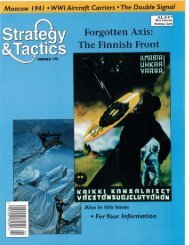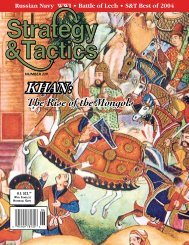COUNTERSTROKE AT SOLTSY - Strategy & Tactics Press
COUNTERSTROKE AT SOLTSY - Strategy & Tactics Press
COUNTERSTROKE AT SOLTSY - Strategy & Tactics Press
Create successful ePaper yourself
Turn your PDF publications into a flip-book with our unique Google optimized e-Paper software.
The Rise of Russia<br />
Modern Russia really began with the rise of the<br />
Muscovite state that, until the end of the European<br />
middle ages, was little more than a vassal of the Mongol<br />
Khanate of the Golden Horde. But a powerful vassal<br />
it was and, by the early 16 th century, Moscovy had<br />
largely destroyed the remnants of Mongolian power<br />
west of the Urals. The Russians then continued to expand,<br />
absorbing the ancient states of Novgorod and<br />
Kiev, as well as sweeping deep into Siberia and Central<br />
Asia.<br />
Of course, when dealing with assorted Mongols<br />
and Asian peoples, the Russians had little concern<br />
for balance of power issues. Consequently, conquest<br />
tended to be complete, including extensive colonization<br />
of subjected peoples. In a sense, it was a clash of<br />
civilizations. The Russians were better organized, and<br />
they also had a military advantage. Traditionally, the<br />
peoples of the Asian steppes relied on horse-mobile<br />
armies that were capable of outmaneuvering enemies<br />
both strategically and tactically. But the rise of modern,<br />
disciplined Western armies equipped with gunpowder<br />
weapons returned the tactical ascendancy to the Europeans.<br />
They could easily smash a nomadic army on the<br />
battlefield. Strategically, the Russians used a combination<br />
of forts, military colonies and secured trade routes<br />
to limit the mobility of steppe armies as well as extend<br />
their own rule. Then there were the personality issues:<br />
the rise of Russia took place in the era of such great<br />
leaders as Ivan the Terrible and Peter the Great, while<br />
the steppe peoples failed to produce another Genghis<br />
Khan or Tamerlane.<br />
The constant eastern warfare gave the Russian military<br />
something of an edge when it came to the practical<br />
aspects of war. Commanders had to be good, or they<br />
would be annihilated. In the 18 th century, the Russian<br />
military proved adept at organizing mobile, combined<br />
arms columns to track down nomad foes. And Russian<br />
commanders such as Alexander Suvarov also became<br />
good at fighting and winning decisive campaigns.<br />
All that underscores the Russian divergence from<br />
contemporary European warfare. The Russians had<br />
a frontier into which to expand. The other European<br />
powers did not, at least not on the continent—hence<br />
their competition for colonies in the Americas and India.<br />
At home, the Europeans were forced into a limited<br />
form of warfare in which diplomacy and mutual preservation<br />
were overriding considerations. The Russians<br />
had more room to maneuver.<br />
Enter Catherine the Great<br />
Catherine, later known as the “Great” (see the sidebar<br />
on biographies), came to power at a unique time in<br />
European history. The year 1762 saw the beginning of<br />
the end of the Seven Years War, which pitted the great<br />
powers against each other both on the continent and<br />
around the world. Britain and Prussia emerged from<br />
the war as the leading powers of Europe, while France<br />
and Austria had their stars eclipsed by battlefield defeat<br />
and financial exhaustion. It was especially bad for<br />
France, which lost its colonies in the New World. [For<br />
more on the Seven Years War, see S&T nr. 231. ed.]<br />
Russia was in a position to assume the mantle of the<br />
primary continental power. And that Catherine did, by<br />
the usual method: war. During her reign (1762-96),<br />
continued on page 26<br />
strategy & tactics 23







